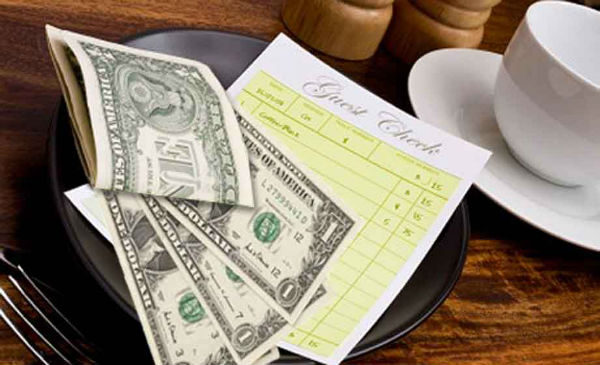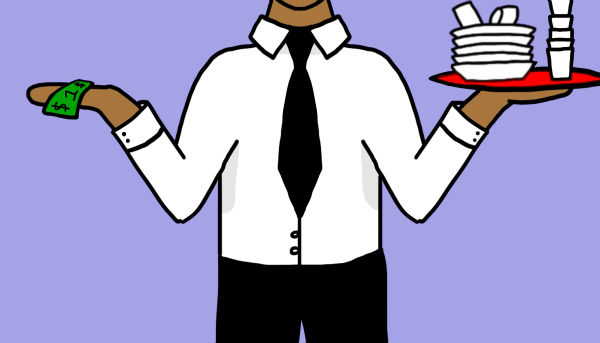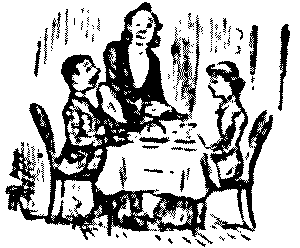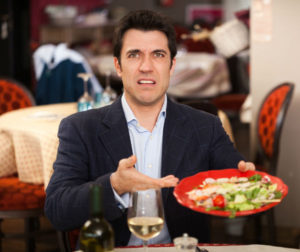For those of us who depend on tipping for income when someone chooses to leave us no tip or a substandard one, we take it very seriously. We’ll stew about it for days, sometimes months or even years later, but we rarely confront the perpetrator. Taking a vow of silence is part of an unwritten code in the hospitality industry—among the Ten Commandments of waiting tables if there were such a thing: Waiters Shall Not Question Bad Tips.
Right or wrong, you’re always taught to accept what you’re given with the humility of a clergyman even if—as is often the case when gratuities are involved—the amount left to you isn’t commensurate with the level of service you think you delivered. It usually isn’t, so you learn not to take it personally. The law of averages is on your side. Bad tips are usually offset by the generosity of others.
But if you value your restaurant job, you have to control your emotions about the tips you receive. Vengeance is impossible when you wear an apron. As much as you think you’ll revel in calling someone out for their crimes against humanity, it’s a war you can never win. People are always gonna be dicks. Sometimes the dicks sit in your section.
But are there ever situations that arise where it’s acceptable for a server to question a tip? A recent experience pushed me to the brink and—against industry mores and, perhaps, my better judgment—I finally did it. I confronted a guest for not tipping. No matter what hospitality purists might say—my sincerest apologies to Danny Meyer—I think I did the right thing.
This particular table, a group of four businessmen from different parts of the world, dined late and had a three course meal. I’d talked them through the menu, made recommendations and the sommelier served them a nice bottle of red. When they were ready to pay, I saw four different credit cards next to the check presenter and I offered to split the check evenly for them. But before I could retrieve their cards, one of the men stopped me.
“We need you to bring over a pretty girl to help us with our game of credit card roulette. Why don’t you bring over the blond hostess who greeted us on our way in?” We’re a mostly male staff, so I didn’t need them to point her out.
“I think you’re asking the wrong guy,” I said half-jokingly, “I bring drinks and food, not pretty girls.” I really hoped that hearing me say this aloud would help them realize the absurdity of their request. It didn’t.
Unbeknownst to me, they had already sent someone else to summon the hostess. Understandably, she felt uncomfortable being put on display and politely refused. We don’t work in a gentleman’s club, after all, it’s a restaurant.
“I’m happy to split the check for you anyway you like,” I said with a friendly tone. But instead of letting it go, they continued to explain why their game would only be fun if it involves the attention of an attractive woman.
“Look—I understand what you’re asking but maybe I’m not making myself clear. I don’t broker bringing pretty women to people’s tables. That’s not what I do. If you need me to divide the bill for you on multiple credit cards, that’s not a problem.”

Eventually, they let it go and asked me to split the bill evenly four ways. One of the cards declined. It wasn’t easy to conceal the joy I felt returning it, but I did. The men got up quickly from the table. People who tip poorly don’t stick around to see the reaction. I retrieved the bill and their four signed credit card slips. Each quarter was charged for over $200, all four men left me nothing. Zero tip on all four cards.
In my head, I quickly ran through a list of potential grievances. I had given them informed guidance about the menu. The sommelier suggested a delicious bottle of wine that fit within their price parameters. Their water glasses were kept full and the table had been maintained well. I checked back with every course to make sure that they were enjoying everything. There were no known issues. I could only conclude that, at least in their minds, that my indifference to agenting female attention to add intrigue to their credit card game justified leaving no gratuity. It was too insulting not to call bullshit. So, at the risk of losing my job, I did.
I followed them out onto the street in my uniform.
“Sir, I don’t mean to make you feel uncomfortable—were you disappointed with your service tonight?” I said to the ringleader.
“Well, yes,” he said, looking uncomfortably at his table-mates, “I guess we were.”
“I have to ask you—did you choose not to leave a gratuity because I didn’t bring a girl to your table for your credit card game?”
“Yes, actually we did,” he said proudly.
“I take a lot of pride in my work and, to be honest, I have to say on a personal level it’s very insulting that you think that part of my job is to bring women to your table to flirt with you. I don’t view that as part of my job or hers—I don’t think my employers do either—and neither should you.”
He puffed out his chest a little but I wasn’t looking for a fight. I wished them all a rote goodnight and turned back toward the restaurant.
Ok, maybe I wasn’t this articulate in real life but you get the idea. I said what I needed to say and I walked away seething. I’m still mad as I write this because I know how many people in our industry have no voice to stand up for themselves when diners behave this way. I wonder how often normal people with normal non-service jobs have to hold their tongues dealing with entitled customers.
Leaving a bad tip is an inherently cowardly act—like breaking up with someone via text message. This man seemed stung by my calling him out and maybe also a little ashamed and embarrassed that I undressed him. As much as I’d like to believe that my employers would stand by me if he contacted the restaurant to report the incident, there’s no guarantee they would take my side. The truth is for most restaurant owners and managers, my behavior in this situation would be considered beyond reproach.
So… should waiters have a right to speak out against bad tippers? To me, it’s a question of dignity. Many people in the industry would have you believe that walking away from such a confrontation is the more dignified response. You are only the waiter after all. It isn’t your business, both literally and figuratively. A staff who recklessly questions tips can injure the reputation of the restaurant. I respect this perspective but I don’t agree with it in isolated cases. There are plenty of scenarios, like this one, where guests take advantage of the fact that the people serving them don’t have a voice or a mechanism to fight back. The most sinister guests get pleasure in lording over us and if we don’t play the game they know they can hit us where it hurts—on the tip line. Restaurant mangers will tell their staff, “let us handle it,” but they usually do nothing to avoid offending a guest.
At the end of the day, though, it isn’t a game. It’s a job. One where people shouldn’t be allowed to receive service for two hours in a restaurant and then trump up flimsy reasons not to tip their servers. When you choose not to tip someone who serves you, you’re making a bold statement. No one should ever be allowed to do so without being prepared to justify the decision.



 backlit nothingness of their cellphone screens. I made a few recommendations after delivering their drinks and informed them that the kitchen would be closing shortly. The men seemed a little drunk but the situation was nowhere near amber alert.
backlit nothingness of their cellphone screens. I made a few recommendations after delivering their drinks and informed them that the kitchen would be closing shortly. The men seemed a little drunk but the situation was nowhere near amber alert. So, I returned to the kitchen to ask the chef to wrap everything to go. He’s annoyed but less annoyed than if I’d canceled the order outright and the food went to waste. “These people are out of control,” he said, giving me the stink eye. I don’t say anything. I’m already showing symptoms of PTSD. “No problem, dude. We’ll wrap it.” His voice sounded relieved all of a sudden. These moments have a way of reminding chefs how fortunate they are not to have to deal directly with the people who eat their food.
So, I returned to the kitchen to ask the chef to wrap everything to go. He’s annoyed but less annoyed than if I’d canceled the order outright and the food went to waste. “These people are out of control,” he said, giving me the stink eye. I don’t say anything. I’m already showing symptoms of PTSD. “No problem, dude. We’ll wrap it.” His voice sounded relieved all of a sudden. These moments have a way of reminding chefs how fortunate they are not to have to deal directly with the people who eat their food.